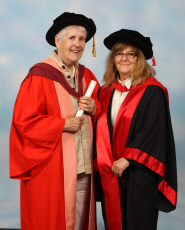She began her work in this field as an untrained occupational therapy assistant in the Bristol area when her husband Peter became a Professor of Psychology at the University.
To mark her work in the city and subsequent impact on people’s lives across the country, Phoebe is to be awarded with a Doctor of Science honorary degree in recognition of outstanding achievement and distinction in a field or activity consonant with the University’s mission.
Over the years she has developed a technique called Intensive Interaction which is a way of engaging with someone using non-verbal conversation, using their own forms of communication whether these are sounds, movements of actions.
The technique had enabled almost every child she has helped to show significant improvement, even those who had been excluded from services because staff were so frightened by their behaviour.
Her work was evaluated by a PhD student at the University of Bristol and, with support from the Mental Health Foundation, the University sponsored the making of a training film showing her work with men who have challenging behaviour.
This was used to train medical students at the University and became a Panorama programme.
She was subsequently supported by the Joseph Rowntree Foundation which provided her with funding to teach her methods to therapists and teachers across the country.
Phoebe’s gone on to write eight books and now works as an independent therapist, trainer and writer.
Professor Kelley Johnson, Professor of Disability Policy & Practice, is delivering the oration at the ceremony and said: “Phoebe has sought not only to try and understand but to change the lives of people in this situation.
“Her aim has been to find ways of conversing which are meaningful and interesting to both parties and which allow a person in this situation to engage with others in meaningful and relevant ways to them. “
Phoebe was awarded The Times/Sternberg Award in 2009, which celebrates the achievements of people aged 70 or over who have channeled their energy and wisdom into a cause that changes the lives of those around them.
